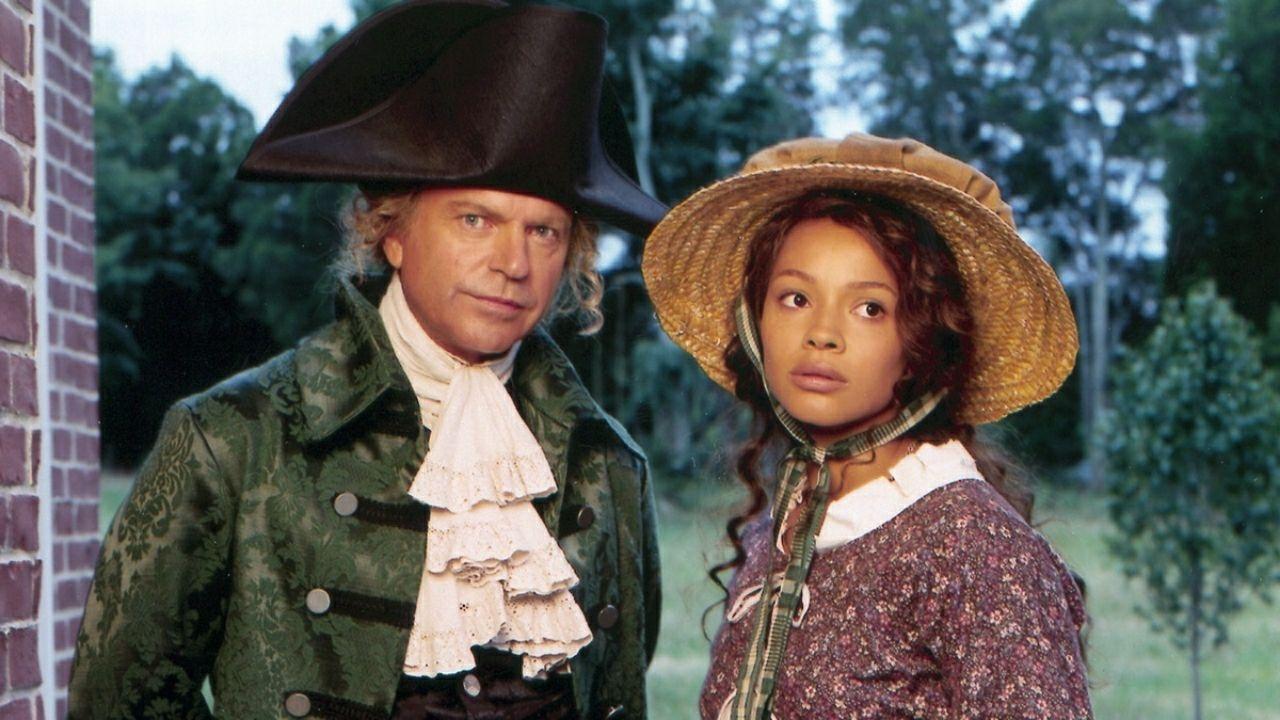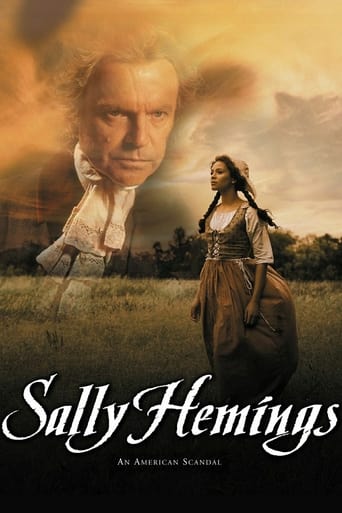

Gripping story with well-crafted characters
... View MoreFantastic!
... View MoreThe film never slows down or bores, plunging from one harrowing sequence to the next.
... View MoreWhile it doesn't offer any answers, it both thrills and makes you think.
... View MoreWith all that has been discovered and written about Thomas Jefferson and Sally Hemings, it's unfortunate that the movie did not stick to facts. The acting was good. 1. It's unclear whether there was a first son Tom who survived. Thomas Woodson was shown through DNA testing NOT to be related to the male Jefferson line. 2. While the movie had to come up with material for times when Jefferson was away, the circumstances of Sally Hemings' status at Monticello make it unlikely that she was attacked and whipped in the way shown. 3. The slaves at Monticello were NOT sold until after Jefferson's death, when they were auctioned off and Monticello was sold. Jefferson had allowed Beverly and Harriet to "run away" years before that, when Harriet was 21. 4. He freed Eston and Madison Hemings in his will. They shared a house in Charlottesville. Martha gave Sally Hemings "her time" (an indirect kind of freedom) and she lived in Charlottesville with her free sons until her death. Thus, all of the Hemings nuclear family were freed - something that points to the special relationship they had with Jefferson. 5. The Thomas Jefferson Foundation, which runs Monticello, and the National Genealogical Society have both stated that the preponderance of historic evidence (supported by the DNA results) is that Jefferson fathered all of Sally Hemings' children, as noted above. Descendants of Eston Hemings were found to be related to the Jefferson male line, and Thomas Jefferson was the most likely candidate as the father of him and the other children. Four Hemings children survived to adulthood, and three of those: Beverly, Harriet and Eston and his descendants, passed into white society. They were 7/8 white by heritage. 6. The Carr nephews were shown by DNA testing NOT to be possible ancestors to the Hemings children. 7. As others have recommended, read Annette Gordon-Reed's book "Thomas Jefferson and Sally Hemings: An American Controversy". It's a good analysis of the evidence and how historians tried to avoid the obvious for years.
... View MoreI wish I had run across this unheralded made-for-TV film several months ago, while I was writing a graduate-level paper on the Thomas Jefferson-Sally Hemings controversy. Director Charles Haid's production brings this age-old debate to life in a moving and I believe-historically accurate manner.Although the writing credits do not mention Barbara Chase-Riboud's 1979 novel, `Sally Hemings,' this work of inspired historic fiction seems to be the primary inspiration for Tina Andrews' screenplay. The novel, likewise, was built upon the 1974 landmark book by Fawn McKay Brodie, `Thomas Jefferson: An Intimate Portrait.' Savagely attacked by the academic elite at the time, Brodie's work was supported by Annette Gordon-Reed's `Thomas Jefferson and Sally Hemings: An American Controversy' in 1996 and by DNA testing two years later. Some still refuse to believe. For the open-minded, though, Brodie and Gordon-Reed's books (which I highly recommend) painted a clear portrait, even if it may have been blurred a bit around the edges. The DNA evidence merely cemented their scholarship.Andrews and Haid, like Chase-Riboud, Brodie and Gordon-Reed, take an even-handed, fair look at events as they may well have happened. Naturally, like Chase-Riboud's novel, this is historic fiction. Large chunks of private lives are recreated on the sparsest bits of evidence and speculation. The story, however, stands up to scrutiny as a fictitious narrative. Did Jefferson and Hemings exchange years of romantic letters, which were later destroyed? We will never know. Did Jefferson's long-term relationship with Hemings, which by its very length would seem to dispel the arguments that it was either an ongoing rape or purely a sexual relationship, affect his ideas on slavery and emancipation? We will probably never know. Does this movie paint a portrait of two very real human beings, acting and reacting as they may very well have done 200 years ago? I believe it very much does so.This is probably not the place for an in-depth analysis of the arguments for and against the Hemings' family claims. Personally, I found in my own research that the relationship between the two seems very likely to have been real and to have been a true love story -albeit a tragic one. If one accepts the basic tenets that Jefferson and the teenage slave became physically and emotionally involved in Paris and that they continued a somewhat secret love affair for nearly 40 years, which bore several mulatto children, then the story of Jefferson and his slaves is a particularly complex and poignant one. A true Enlightenment man, Jefferson was certainly keenly aware of the disparity between his words `all men are created equal' and other such epitaphs and his ownership of more than 100 African-American slaves.As in the Chase-Riboud novel, Jefferson is seen as a good man, but far from perfect. Sam Neill, although his physical resemblance to the third president is slight, captures the complexity and ambiguity of this brilliant, yet tortured individual. In his heart he knows slavery is wrong, but can never bring himself to abandon his rising political star by taking such a politically suicidal stance. Later, after his wealth and influence have crumbled, he is wracked by regret for not having used his earlier power to fight slavery. At least this is Haid's take and I think it is a perfectly supportable one. Carmen Ejogo, meanwhile, is lovely and convincing as the mysterious Sally Hemings. Unlike Chase-Riboud's character, Ejogo's Sally is not sophisticated beyond all likelihood for her time and place. She could read and write French and English and obtained many of the social skills of a genteel country lady; yet she was probably not the cerebral debutant of the novel.The rest of the cast is strong, including legendary black actress Diahann Carroll as the family matriarch, Betty Hemings, and Mare Winningham as Martha Jefferson Raldolph. While Andrews and Haid may occasionally slip into presentism and have Sally and others mouth very 2000-sounding lectures on black pride, etc., they generally avoid such temptations. The movie transports the viewer into Jefferson and Hemings' world and into their lives as they very well may have been lived.
... View MoreTHE FACTS:She was a slave. He was a slave owner.Any "romance" that blossomed under those circumstances is instantly suspect. Love is free. Love is willing. Love should not be kept under lock and key. Yeah, maybe Sally legitimatly fell in love with TJ BUT the fact still remains, she was his property. What options did she have? What if 14-15 year old Sally had said no to her 42-43 year old "massa" Thomas? But on to the movie itself. Did it make a honest attempt to tell this story, taking in consideration the circumstances in which these people lived or did the creators take the sleasy route and just make it some wack romance novel come to life?Yep...worse fears confirmed...Tina Andrews(writer) turned it in to a part GONE WITH THE WIND, part IMITATION OF LIFE, part THORN BIRDS, all crap. Oh sure we got to see Diahann Carol smack ol Sally upside the head and my goodness, for a slave, Sally sure did get around didn't she? I was expecting Rhett Butler to come rolling through, proclaiming his love for Sally as well.What a load of crap.This movie made slavery look like fun, like an Disney amusement park(SLAVERYLAND! Where Ol' Times Are Not Forgotten! Zippadee Doo Dah Zippadee Yea!), made Sally look like a spoiled(how dare she want Thomas to promise not to sell her!)Lolitaish(her "seduction" of a "resisting" Thomas in romantic pre-French Revolution Paris is sure to be a "classic")civil rights feminist and Thomas as a reluctant, foot soaking, tortured(he supposedly did not agree with the institution of slavery but yet owned slaves and sold some of them to pay off his debts)romantic.Did I already mention that this was a load of crap?To take an period in American history as horrifying as slavery and to use it as a backdrop for a two bit Danielle Steele knockoff is demeaning not only to the audience watching this train wreck of a mini-series but to the memories of those who endured Slavery. Period.
... View MoreI liked this movie, I didn't love it, however. I don't think that the relationship between Sally and Jefferson was particularly startling, I don't understand why the relationship would be a shock to anybody. Slaves are people too, so of course, people can fall in love with a slave, it's not impossible. I happen to be a black girl who likes white men, shocking? I think not. I do think that this movie did not concentrate on family, enough, I wouldn't have expected Jefferson to have long chats with his biracial children, but Sally too hardly said anything to them. And I so wish that people would quit calling Sally Hemings black, or colored. Sally was white AND black, a simple blood test would show that. Most blacks don't choose to believe that blacks should be considered less than a whole human, but they'll go for that one-drop-of-black-blood crap in a second! Carmen Ejogo didn't play Sally as well as Thandie Newton did to me, but she did a fine job!
... View More